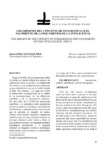Mostrar o rexistro simple do ítem
Los orígenes del concepto de inteligencia II: el nacimiento de la psicometría de la inteligencia
| dc.contributor.author | López González, Laura | es_ES |
| dc.date.accessioned | 2014-09-23T12:37:43Z | |
| dc.date.available | 2014-09-23T12:37:43Z | |
| dc.date.issued | 2013 | es_ES |
| dc.identifier.citation | Revista Galego-Portuguesa de Psicoloxía e Educación, 2013, 21: 49-61. ISSN: 1138-1663 | es_ES |
| dc.identifier.issn | 1138-1663 | es_ES |
| dc.identifier.uri | http://hdl.handle.net/2183/12605 | |
| dc.description.abstract | [Resumen] Hasta el S.XIX, las investigaciones sobre el cerebro no existían debido a la ausencia de instrumentos para su estudio, a la complejidad del cerebro y a las medidas sociales adoptadas ya que consideraban que en el cerebro residía el alma. No obstante, a lo largo del S.XIX se producirían investigaciones en el campo de la neuropsicología, de las ablaciones cerebrales y de la estimulación eléctrica. Por otro lado, en el S.XIX los naturalistas concebían a la naturaleza como generadora de nuevas especies y dio lugar a una hipótesis transformista y, posteriormente evolucionista que se aplicaría al concepto de mente. Autores como Galton realizaron importantes contribuciones al campo de la psicometría. La principal diferencia entre Galton y Binet es que el primero planteó un programa científico tecnológico hereditarista y el segundo defendió un programa científico tecnológico ambientalista. Ambas posturas se mantendrían a lo largo del S.XX y aún en nuestros días hallamos defensores de una u otra corriente. | es_ES |
| dc.description.abstract | [Abstract] Until the 19th century investigations about the brain didn´t exist due to the lack of instruments to study the complexity of the brain and the social measures adopted because in that period a lot of people considered that the soul resided in the brain. During the 19th century some investigations would take place in the field of neuropsychology, the cerebral ablations and the electrical stimulation. On the other hand, in the 19th century naturalists conceived that nature generated lots of new species and it gave rise to a transformist and evolutionist hypothesis and it would be applied to the concept of mind. Authors such as Galton made significant contributions to the field of psychometry. The main difference between Galton and Binet was that the first author raised a scientific-technological program based in the inheritance and the second author defended a scientific-technological program based in the environment. Both positions would stay throughout the 20th century and still in our days we can find a lot of defenders of one or another current. | es_ES |
| dc.language.iso | spa | es_ES |
| dc.publisher | Universidade da Coruña | es_ES |
| dc.subject | Psicometría | es_ES |
| dc.subject | Cerebro | es_ES |
| dc.subject | Aprendizaje | es_ES |
| dc.subject | Tests de inteligencia | es_ES |
| dc.subject | Psychometrics | es_ES |
| dc.subject | Brain | es_ES |
| dc.subject | Learning | es_ES |
| dc.subject | Intelligence tests | es_ES |
| dc.title | Los orígenes del concepto de inteligencia II: el nacimiento de la psicometría de la inteligencia | es_ES |
| dc.title.alternative | The origins of the concept of intelligence:the psycometry of the intelligence. Part II | es_ES |
| dc.type | info:eu-repo/semantics/article | es_ES |
| dc.rights.access | info:eu-repo/semantics/openAccess | es_ES |






